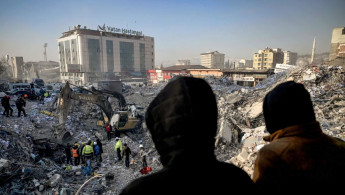Turkey grants Syrian refugees in quake-stricken border areas permission to travel to Syria
Turkey will allow Syrian refugees in quake-stricken areas of the country to visit Syria without obtaining a travel permit, according to statements from the governing body of the main border crossing between the two countries.
Syrians holding a Turkish temporary protection card – or Kimlik – residing in the affected areas will be allowed to "take holidays" to their home country from Wednesday for a minimum of 3 months and a maximum of 6 months, according to the Bab al-Hawa border crossing.
This means Syrians can't return until they have spent three months in their motherland, and must return to Turkey within six months.
However, Syrians travelling from the Tal Abyad border - which allowed Syrians to cross from Monday - can leave for a minimum of 1 month and a maximum of 6 months, the crossing announced on Monday.
The 7.8-magnitude earthquake hit Syria and Turkey last week, causing over 37,000 deaths and devastation "not seen in over a decade", according to humanitarian response groups.
Syrians residing in Hatay, Maras, Diyarbakir, Gaziantep, Kilis, Adi Yaman, Sanliurfa, Ottoman, Malatya, and Adana may cross the borders.
Director of relations at the Bab al-Hawa crossing Mazen Alloush stressed to The New Arab’s Arabic service Al-Araby Al-Jadeed, that these Syrians will be able to return to Turkey.
The decision to allow came from Turkish authorities, according to Alloush.
Tal Abyad initially announced that the minimum leave for Syrians would be three months, like Bab al-Hawa, however, Syrians complained under the crossing’s social media comment section asking for a shorter minimum period.
Rescue missions will soon be coming to a close, according to the White Helmets, as the time since the quake reaches the limits of the human body’s ability to survive without water, especially in sub-freezing temperatures.
It is estimated that as many as 23 million people across Turkey and Syria have been affected by the tragedy.





 Follow the Middle East's top stories in English at The New Arab on Google News
Follow the Middle East's top stories in English at The New Arab on Google News


